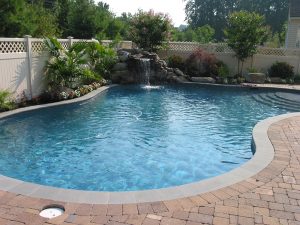
If you are considering installing a new pool in your backyard this summer, there are countless decisions to make.
If you are considering installing a new pool in your backyard this summer, there are countless decisions to make. What shape will your pool be? What type of pool fence will you install? How will you integrate your beautiful landscaping into your pool design? One of the most important questions that many pool shoppers completely forget about is what type of water they would like to put in their pool. So, which is better? Will you choose a saltwater or chlorine pool?
Chlorine: The Traditional Option
Chlorine was first used to treat pools in the late 1800s as a way of making the water sterile. Swimming pools began using chlorine in the early 1900s, when scientists realized that treating with chlorine could keep swimming pool water sterile for extraordinarily long periods of time. Since then, chlorine has become the standard treatment for pools across the country.
Chlorinated pools are typically treated with a slow-release designed to keep chlorine levels stable and supplemented with a chlorine shock treatment whenever the levels are out of whack. Chlorine remains an incredibly popular choice for treating pools because it is so effective at sterilizing the water. It cleans out bacteria, completely disinfects the water, and reacts to ammonia and organic substances that dirty a backyard swimming pool.
Saltwater: The New Contender
One of the biggest challengers to chlorine pools has roots in the oceans that surround us—saltwater. Saltwater chlorination was developed in the 1970s and started to become more commonplace in the 1980s. Since salt is sodium chloride, you can make chlorine in your pool through electrolysis. Saltwater in your pool is run through a chlorinator and treated with an electrical charge. Chlorine has been produced and is now a natural part of the water in the pool.
As long as the saltwater in the pool is salty enough, this process works smoothly. In addition to adding salt to keep the water consistent, you will need to add hydrochloric acid to keep the water at a neutral pH. Saltwater pools continue to gain popularity because they are more mild than chlorine pools and create chemicals naturally, instead of requiring constant additions of dangerous and hazardous chlorine.
Pools from Honeysuckle Nursery and Design
At Honeysuckle Nursery and Design, you will get construction and maintenance crews on site who have a minimum of 10 years of experience in all types of landscaping. Our designers will work closely with you to understand how you want to use your space so that we can make the most of your entire site. We are committed to providing complete customer satisfaction and will work with you along every step of the way to be sure that you are happy with your landscape design.
Ready to start planning your new professional landscape design? Give us a call at 410-849-5119 or send us an email to schedule your free no-obligation estimate today! Don’t forget to follow us on Facebook, Twitter, Google+, Houzz, and Youtube!
